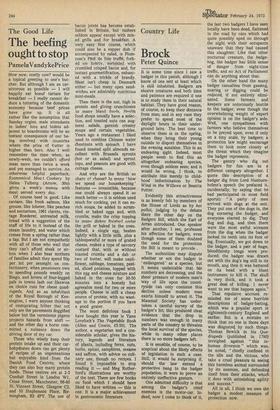Country Life
Brock
Peter Quince
It is some time since I saw a badger in this parish, although I know of one sett at least which is still inhabited. Badgers are elusive creatures and both time and patience are required if one is to study them in their natural habitat. They have good reason, of course, to keep their distance from man; and in any case they prefer to spend most of the daylight hours in their underground lairs. The best time to observe them is in the spring, when they bring their young outside to disport themselves in the evening sunshine. This is an endearing light. Indeed, most people seem to find this an altogether endearing species, even though seldom seen; and it would be wrong, I think, to attribute this merely to childhood indoctrination by The Wind in the Willowsor Beatrix Potter.
Evidently this attractiveness is as keenly felt by members of the House of Lords as by hoi polloi, judging by the debate there the other day on the Badgers Bill, which the Earl of Arran introduced. One speaker after another, I see, professed his affection for badgers, even though some of them doubted the need for the protection the Bill is meant to provide .
The authorities may dispute whether or not the badger is ' endangered' as a species, but it seems undeniable that his numbers are decreasing, and the sheer pressure of modern man's way of life upon the countryside can only continue this decline unless modern man exerts himself to arrest it. The Mammal Society has undertaken a careful survey of the badger's lot; this produced clear evidence that the drop in numbers, was enough in many parts of the country to threaten the local survival of the species, while in many other places there is no more badgers left.
It is sensible, of course, to be sceptical about the likely effects of legislation in such a case. Still, it would be surprising if, should the law extend a protective hand to the badger population, it were to prove an entirely ineffective gesture.
One admitted difficulty is that among the badger's chief enemies is the motor-car. Indeed, now I come to think of it, the last two badgers I have seen locally have been dead, flattened in the road by cars which had quite possibly sped on through the night with their occupants unaware that they had caused this slaughter. Like that other nocturnal creature, the hedgehog, the badger has Little sense of danger from night-time traffic, and no Act of Parliament can do anything about that.
On the other hand the many badger casualties from gassing, snaring or digging could be reduced, if not entirely eliminated. Some farmers and keepers are notoriously hostile to the badger, even though the overwhelming weight of expert opinion is on the badger's side. Well, one sympathises with farmers who believe themselves to be preyed upon, even if only on a tiny scale, by badgers; a protection law might encourage them to look more closely at the threat which they imagine the badger represents.
The gentry who dig out badgers for fun are in a different category altogether. I quote this description of a badger dig from Lord Nunburnholme's speech (he prefaced it, incidentally, by saying that he had participated in most field sports): "A party of men arrived with dogs at the sett. They put one of the dogs in, the dog cornered the badger, and everyone started to dig. They dug and dug, and then there were the most awful screams from the dog when the badger locked its teeth into its foot or leg. Eventually, we got down to the badger, and a pair of huge, bloodthirsty tongs were pro duced; the badger was drawn out with the dog's leg still in its mouth, and then it was battered on its head with a blunt instrument to kill it. The skull is very thick, and it took a great deal of killing. I never want to see that happen again." That repulsive account reminded me of some horrible descriptions of badger-baiting, which was a popular sport in eighteenth-century England and earlier. But is a mistake to think that no one in those days was disgusted by such things.
Thomas Bewick in his Qua drupeds (published in 1790) inveighed against " this in human diversion" which was, he noted, "chiefly confined to the idle and the vicious, who take a cruel pleasure in seeing this harmless animal surrounded by its enemies, and defending itself from their attacks, which it does with astonishing agility and success."
All in all, I think we owe the badger a modest measure of protection now.


































 Previous page
Previous page